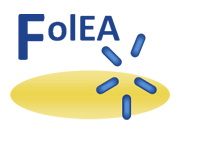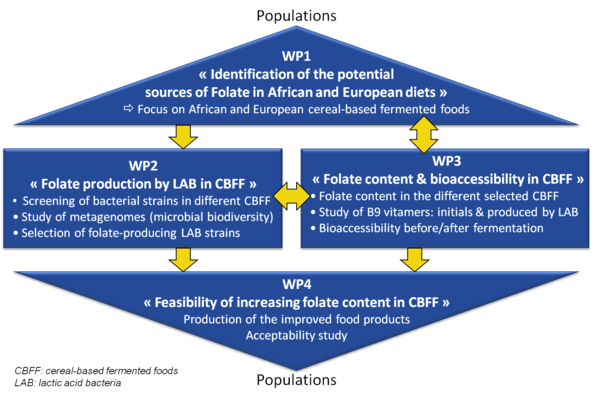This project is coordinated by IRD, Institut de Recherche pour le Développement
NUTRIPASS unit "Food and Nutrition Research in the Global South"
UMR Nutripass, 911 avenue Agropolis, BP 64501 34394 Montpellier Cedex, FRANCE
Christèle HUMBLOT , Coordinator
Tel : + 33 (0)4 67 41 62 48
Fax: + 33 (0)4 67 41 61 57
For the FolEA partners only: you can sign in to access the "private area", with more information on the project, and access to the documents.
A password is needed (contact Youna Hemery to get your login & password).
Presentation of the FolEA project
Folate (vitamin B9) is involved in vital functions of cell metabolism. Inadequate dietary intakes lead to deficiencies, which induce important health problems, ranging from megaloblastic anaemia, cardiovascular risks, to neural tube defects. Folate deficiency is commonly observed in developing countries, but also in many industrialized contexts.
Even if the most important natural source of dietary folate is leafy vegetable, cereal-based foods can greatly contribute to folate intakes . Indeed, they contain non-negligible amounts of folate, and are frequently consumed . Some countries have established mandatory food fortification with synthetic folic acid, but despite the observed beneficial effects, concerns exist over the possible adverse effects in some subpopulations in case of large-scale fortification.
Another solution to improve the folate content of cereal-based staple foods would be to use in situ fortification by fermentation. In addition to the advantages presented by fermentation (increase in sanitary and nutritional quality), this process is an ancestral way of preserving food products and is a sustainable process (low effluents production and little energy consumption). The production of folates by lactic acid bacteria (LAB) during food fermentation has been validated in dairy products but the data on cereal based fermented foods (CBFF) are scarce. Furthermore, the bioavailability of natural folate forms (vitamers) has been rarely studied, especially in African foods.
The fight against vitamin deficiency is an “interfacing challenge”. It is related to food security, health, but also biodiversity. The objective of this project is to evaluate the possibility of improving folate intakes by target populations, by increasing the folate contents of traditional cereal staple foods through fermentation . Therefore, we will make use of the diversity of microorganisms naturally present in those food products.
This project consists of 4 work-packages:
In WP1 , an estimation of the contribution of cereal-based fermented foods (CBFF) to the cover of folate needs in the target populations will be calculated, for the five countries of the consortium (Finland, France, Burkina-Faso, Ethiopia, South-Africa) that represent various nutritional contexts.
In WP2 , the potential of folate production by the microorganisms involved in the fermentation of the model foods will be studied. The most consumed CBFF (in the countries of the consortium) will be studied. A combination of metagenomic and classical microbiological approaches will be used.
In WP3 , the folate content will be assessed for the samples studied in WP2 . This will allow selecting a few LAB strains (the most producing ones) to identify the produced vitamers and study their potential absorption during food digestion .
In WP4 , the identified high folate-producing bacteria will be used to produce improved CBFF with high folate content . The consumer acceptability of those food products will be tested in each country. Finally, we will estimate the potential of using optimal CBFF to increase the folate intake by our target populations.












